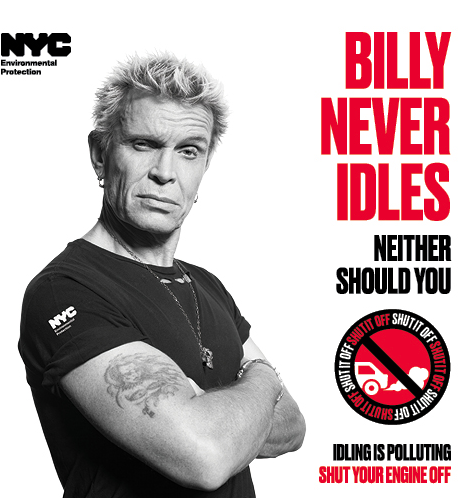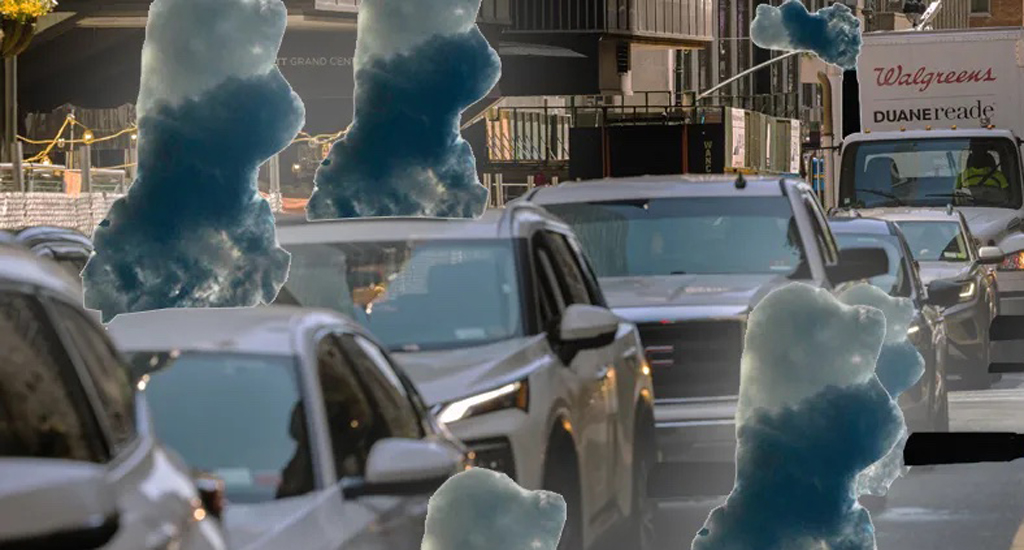The city exempted armored car company Loomis from its 52-year-old anti-idling law in 2023 after the company pledged to fully electrify its New York City by 2025 — and now three more armored vehicle firms want the same treatment.
The three companies — Brinks, Garda and IBI — requested variances from the Department of Environmental Protection and pledged to move towards vehicle electrification, albeit with less heft than Loomis proposed last year.
Brinks, Garda and IBI pledged to electrify just 48 percent, 34 percent and 14 percent of their fleets in exchange for the right to idle on city streets with impunity, according to their variance requests posted online by DEP on Wednesday.
If granted, the variances would give the companies a free pass to let their gas-powered vehicles idle on city streets without the threat of DEP fines. All four firms have received significant numbers of tickets via DEP's citizen enforcement program, which rewards complainants with a 25-percent bounty if companies are found guilty.
The citizen reporting program fueled exponential growth in idling enforcement in the last five years — augmenting DEP's relatively small enforcement team and NYPD's near-abandonment of idling enforcement. But the deals with Loomis and Secure Cash, another payload transport company, shown that DEP has a willingness to let some companies slide if they commit to fleet electrification.
Streetsblog previously reported on DEP's use of the tickets as leverage to compel companies to electrify their fleets.

"I've been quite explicit ... about the extent to which vehicle electrification is the way we end idling once and for all," DEP Commissioner Rohit Aggarwala told Streetsblog this week. "I believe very strongly that the variance we gave last year to Loomis was entirely justified and exactly the right kind of plan that we should reward."
"They had a fairly aggressive timetable for a nearly complete electrification," the commissioner said of Loomis. "That is precisely the kind of fleet changeover that I would like to reward. From my point of view, the fact that they were an armored car was far less relevant than the fact that they came to the table with a concrete plan to end idling."
It's unclear why the four companies now seeking variances think they can win DEP approval without full commitments to electrification.
The fourth firm, bus company DJ Transportation, also requested a variance — with no commitment to electrify any of its 218 vehicles. The company claimed its contracts with the state Office of People with Developmental Disabilities require that vehicles maintain a certain temperature before picking up passengers. DEP has asked the state to bring its contracts to in line with state idling law.
DJ Transportation insisted in its request that "a vehicle that holds a battery big enough to operate a complete day does not presently exist" — a claim that flies in the face of moves by the MTA and other transit agencies to purchase hundreds of electric buses. Garda cited financial and logistical hurdles to full electrification.
Brinks, one of the city's top idling violators, will install "idle reduction technology" on the portion of its fleet that remains gas-powered, according to its variance request. Vehicles will only idle for "driver safety," the company claimed.
But such a variance would leave DEP without any way to enforce that standard — and allow the companies to continue to idle without the threat of enforcement.
"I think of these as get-out-of-fines-free cards," said Hayden Brockett of the New York City Clean Air Collective. "DEP has already shown that they're willing to trade our health for empty promises from one corporation, and I think that's why Brinks and Garda are out here trying to get the same deal.
"Loomis is still out there, idling complete with complete impunity. They're idling way more than they would if we enforced the law."
The armored transport companies insist their work necessitates illegal idling to maintain ventilation inside the vehicles and keep crews safe from, as Brinks puts it, "an imminent attack."
"The engine must remain running during stops to ensure the operability of security systems, temperature regulators, and operational protocol necessary to safety of all parties," according to a 2022 letter from the National Armored Car Association included in both Garda's and Brink's application.
All three armored car companies have made moves to purchase EVs, but IBI insisted in its request that it is still developing "an armored unit with enough battery life to provide continuous power to all ... electronic systems." Garda claimed "diligent research" failed to identify a "viable and commercially available" way to "power the ventilation, security systems and permit immediate access to engine power ... without engine idling."
Those claims ignore the reality on the ground, citizen enforcers told Streetsblog. Many of the companies' idling violations occur when the vehicles are not in the process of making deliveries, they said. If the average stop takes 10 minutes, as Garda claims, there's no reason a truck would run out of battery power.
"If they drive, the engine is on. By doing so, they charge their batteries. So like any other car, when they stop for a few minutes, that doesn't mean they're incapacitated," one regular citizen complainant, Patrick Schnell, told Streetsblog. "If you shut off your engine, it's not like you're going to be dead in five minutes. I don't think this is an imminent threat to life."
If vehicle batteries actually drain from the armored car technology, the companies should have to prove that, Schnell added — the variance requests included no such details.
"They need to stop idling today. Just because they also electrify their fleet is not an argument that they can't stop idling today," Schnell said. "They've had 50 years to do something about [this]. They've flouted the law for 50 years."
New York City passed its idling ordinance in 1972, but enforcement was negligible until the citizen complaint program got off the ground a few years ago.
The Daily Show recently profiled the small cadre of citizens who do the bulk of the enforcement. Most violations go to a handful of companies — many of whom refuse to pay.
The citizen complaint program appears to be pressuring companies to the negotiating table.
"This law has been on the books for 50 years, and Brinks has never made any changes until they started getting tickets," Brockett said.

The city's administrative code allows the DEP commissioner to grant variances to air pollution regulations if companies can present "adequate proof" that the regulation "would impose unreasonable hardship." Companies must petition for such exemptions.
The four proposed variances will get hearings on May 29, when the public will be able to comment, DEP said. (DEP also takes comments online at this link.) The agency will then decide whether to allow the exemptions.
"Some approach to variances, I think, is appropriate. We just have to use them strategically and in the spirit of law," Aggarwala told Streetsblog.
Aggarwala said if DEP and other city agencies can figure out a way to electrify heavy duty vehicles, so can private companies.
"New York City is doing a really impressive job of electrifying its fleet, including, in many cases, medium and heavy duty vehicles, that people only a year or two ago were saying could never be electrified," he said. "DEP and the city government are walking the walk on vehicle electrification."
But environmental advocates warn that any permission to idle is harmful to the health of New Yorkers — and the workers who drive the idling vehicles.
"When a vehicle idles, it releases very harmful pollutants in the air," said Suhali Méndez from New York Lawyers for the Public Interest. "Even once the smoke clears, there is very, very harmful particulate matter that causes cardiac as well as respiratory issues."






